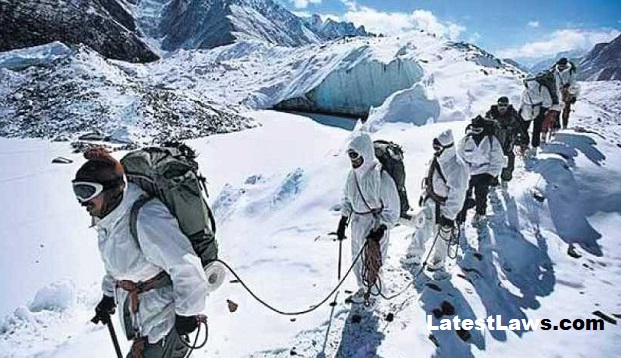September 13, 2018
The facility will be useful for soldiers in areas like Siachen Glacier, where there are no normal medical care services available.
The Indian Space Research Organisation (ISRO) is stepping up its efforts to support the defence forces in the country in offering medical support to theh soldiers at remote destinations, where they would fight both nature & enemy's fury.
According to the govt, a Memorandum of Understanding (MoU) for the establishment of 'Telemedicine' nodes was signed between the development & education communication unit (DECU) of Isro, Department of Space, integrated defence staff (medical) and the Ministry of Defence.
"Isro will establish 53 more nodes in the 1st phase in addition to the existing 20 in various establishments of the Army, Navy & Air Force across the country. This joint initiative by Isro & the Armed Forces Medical Services will radically transform the reach of telemedicine to combat soldiers, airmen & sailors deployed in remote & isolated posts," said Additional Directorate General of Public Information, Indian Army.
The facility will be useful for soldiers in areas like Siachen Glacier where there're no normal medical care services available.
Isro has been working on telemedicine projects for several years now & has established communication with various hospitals to meet the healthcare demand of the common man & defence personnel in remote parts of the country.
Isro telemedicine programme, which started in 2001, has been connecting remote/rural/medical college hospitals & mobile units through Indian satellites to specialty hospitals in cities & towns.
Isro telemedicine network covers various states/regions, including Jammu & Kashmir, Ladakh, Andaman & Nicobar Islands, Lakshadweep Islands, Northeast.
Many tribal districts of Kerala, Karnataka, Chhattisgarh, Punjab, West Bengal, Orissa, Andhra Pradesh, Maharashtra, Jharkhand & Rajasthan are also covered under Isro's programme.
According to Isro website, the telemedicine network of Isro covers about 384 hospitals with 60 specialty hospitals connected to 306 remote or rural/district/medical college hospitals & 18 mobile telemedicine units, which ophthalmology, mammography, cardiology, radiology, diabetology, general medicine, women & child healthcare.
The satellite bandwidth for telemedicine programme is provided on INSAT-3A & GSAT-12 satellites.
While Isro provides telemedicine systems software, hardware & communication equipment as well as satellite bandwidth, state govts & the specialty hospitals have to allocate funds for their part of infrastructure, manpower & facility support.
In this regard, technology development, standards & cost-effective systems have been taken in association with various state govts, NGOs, specialty hospitals & industry.
A telemedicine monitoring node has been established in the Development and Educational Communication Unit (DECU), Ahmedabad, which's used for testing & supporting users for minor troubleshooting, etc.
Earlier, the DECU had entered into enabling the authorities in ensuring medical support to the pilgrims to Amarnath temple.
In July 2016, a team consisting of senior officials from DECU/Isro (Ahmedabad) & Directorate of Health Services (Srinagar) carried out the work to set-up the telemedicine node at Sheshnag base camp enroute Amarnath Shrine under extreme weather conditions, difficult terrains & other unexpected challenges.
The Sheshnag telemedicine node consists of a Very Small Aperture Terminal (VSAT) System, video conferencing equipment, telemedicine software along with medical diagnostic instruments like an ECG machine & X-ray scanner.
The teleconsultation for this node have been planned with the assistance of PGIMER (Chandigarh), SKIIMS (Srinagar), AIIMS (Bhopal), JIPMER (Puducherry). However, the teleconsultation can be obtained from any of the super-specialty nodes set up across the country.
Picture Source :

























